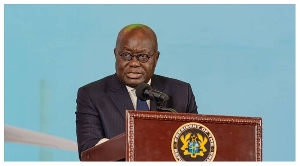Business News of Monday, 6 April 2020
Source: thebftonline.com
Minority questions UNIPASS deal, says there is ‘no value for money’
The award of a customs administration solution to UNIPASS has been challenged by the Minority in Parliament, with the MPs noting that the deal is one fraught with fraud and has “no value for money”.
Ghana Link Network Services in February this year launched the solution, developed by Customs UNIPASS International Agency (CUPIA) of South Korea Customs Services, which would also act as a trade facilitation tool that would be deployed at the country’s ports as the national Single Window System for revenue.
However, the Minority reckons the entire deal has not been legitimate to indigenous companies such as GCNet and West Blue who were originally contracted to handle the transaction.
According to Yusif Sulemana, Deputy Ranking Member on the Trade, Industry and Tourism Committee, GCNet and West Blue provided or are providing end to end processing platforms to which enabled the country roll out the paperless regime government sought to do.
Since its introduction in 2015, government revenues have consistently risen except in 2019 when government reduced benchmark values at the ports. The accumulated growth in customs revenues between 2015 and 2018 was about 76 percent approximately rising from some GH¢7.5 billion in 2015 to about GH¢13.2 billion in 2018.
For this stellar performance, GCNET and West Blue which are currently contracted till the end of 2023 and 2020, respectively; are paid a combined fee of 0.54 percent of Free on Board (FOB) i.e. taking into consideration government’s 35 percent shares in GCNET, Mr. Sulemana explained.
However, without any concrete reason, the Nana Akufo-Addo government, after assuming office in 2017 has been bent on getting rid of the two companies and replacing them with a company with no credible track record in delivering similar solutions, Ghana Link Network Services Ltd (Ghana Link).
That for the Minority is problematic and they also added that even if UNIPASS is coming on board – what extra capacities are they offering, to the extent that government cannot wait for their respective contracts to expire before they sign on a new one?
Speaking in an interview, he said: “As we speak until they were brought on board in 2017 and later on suspended for eight good months the system has been running, so it is not as if there is something urgent for which we have to bring them on board and if that is the case – why are you using sole sourcing?” he asked, maintaining that in terms of procurement practices government has flouted it.
They also contend that there is no justification for government to seek to replace competent, internationally recognised, indigenous home-grown companies and systems with foreign systems, particularly in this era of self-sufficiency and Ghana Beyond Aid.
The Minority, thus, has a raft of questions they want government to answer. Among some of the questions are: why government is seeking to replace companies and systems that are tried and tested with those that are not.
The other question is why will government be sole-sourcing a system of this kind when an international competitive process will have given Ghana better value for money, why government is ignoring the record of Ghana Link and its subsidiary in Sierra Leone in this whole transaction?
Another issue they raised is why government is agreeing to pay US$93 million in case of a termination for a contract worth US$40 million, why government is choosing to abrogate cheaper contracts for more expensive one and they also want to know the problem with current system that warrants its replacement.
Most importantly, they also argue that there is nothing unique in the Ghana Link/UNIPASS deal which will make replacing the current service providers justifiable. They also questioned the feasibility study which is a condition precedent in the agreement they signed with Ghana Link to show the extraordinary benefits that are expected from the Ghana Link contract.











